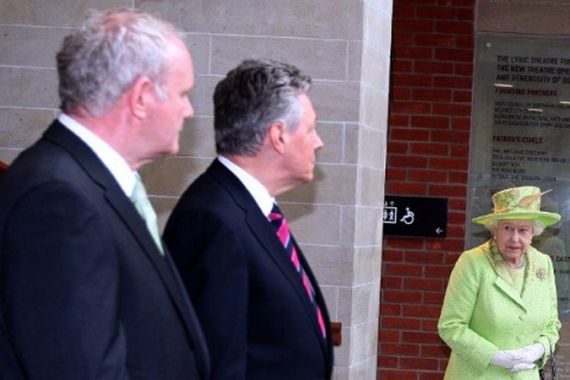UK queen and ex-IRA chief in historic meeting
Elizabeth II shakes hands with Northern Ireland’s deputy first minister in Belfast, marking milestone in peace process.

Britain’s Queen Elizabeth II has shaken hands with the former chief of the Irish Republican Army (IRA) for the first time, marking a milestone in the Northern Ireland peace process.
The landmark meeting with Martin McGuinness, who is now the deputy first minister of Northern Ireland, on Wednesday came 14 years after the IRA ended its violent campaign against British rule in the province.
The queen also greeted Peter Robinson, Northern Ireland’s Unionist first minister, and Michael Higgins, Ireland’s president, for just under 10 minutes behind closed doors in a theatre in a suburb of Belfast, the capital.
There has been some opposition to the gesture of reconciliation from dissident Irish and from some of the IRA’s victims.
But the vast majority of the province’s politicians backed the meeting, the first between the queen and a leading member of the IRA or its former political wing, Sinn Fein.
“Today is a huge event and it is, in a sense, the ultimate handshake,” said John Reid, the former British secretary of state for Northern Ireland.
“On all sorts of levels this is a hugely significant step but it is only one more step in a long process.
“This may take generations – to get back to absolute reconciliation in Northern Ireland and the island of Ireland.”
McGuinness denial
Thousands of soldiers and civilians were killed in the the Irish war of independence, an armed rebellion launched by the IRA against the British government and its forces in Ireland that began in 1919 and ended in a ceasefire agreement in 1921.
Diplomatic talks following the truce led to an Anglo-Irish Treaty, which put an end to British rule in most of Ireland.
The queen regularly meets senior Unionist politicians and Protestants who want Northern Ireland to stay inside the UK, but not Sinn Fein – the largest party representing Catholic nationalists who want a united Ireland.
McGuinness is a hero to Republican hardliners, but has long been a hate figure to many Unionists, some of whom harbour deep suspicions about his past.
He admits he was on the front line in the conflict with British forces, including on Bloody Sunday in 1972, when troops shot dead 13 unarmed protesters, but says he never killed anyone.
A British report said that McGuinness probably was armed with a submachinegun on Bloody Sunday, but did nothing to provoke the massacre.
He has said he left the IRA in 1974, but most historians believe he was active for most of its campaign.
Personal edge
For Elizabeth II and her husband Prince Philip, who also shook McGuinness’s hand, the Northern Ireland conflict had a personal edge.
The queen’s cousin, Lord Louis Mountbatten, who was also Philip’s uncle, was killed by the IRA in 1979 with three others, including Mountbatten’s 14-year-old grandson, when his boat was blown up while he was on holiday in Ireland.
More than 1,000 members of the British security forces were among 3,600 people killed during the 30 years of the conflict with Irish dissidents.
McGuinness told the queen that he agreed with comments she made last year that all victims of the conflict should be remembered, according to a source who was at the meeting.
Some Republicans branded McGuinness a traitor for meeting the queen who is also commander-in-chief of Britain’s armed forces.
“People are not unhappy that someone is shaking her hand, just not him. He’s a hypocrite,” said Martin, a 42-year-old man who said he and his friends had got criminal records defending their neighbourhood in Belfast.
“He sent people out to fight. To die. And now he’s putting on a suit and shaking her hand? I don’t want war [but] this shouldn’t have happened till the next generation.”
With Irish splinter groups continuing to attack British targets until now, security forces say the risk of an attack is at its highest level since the Good Friday peace agreement was signed in 1998.
Nine police suffered minor injuries on Tuesday night when they were pelted with petrol bombs and other missiles.